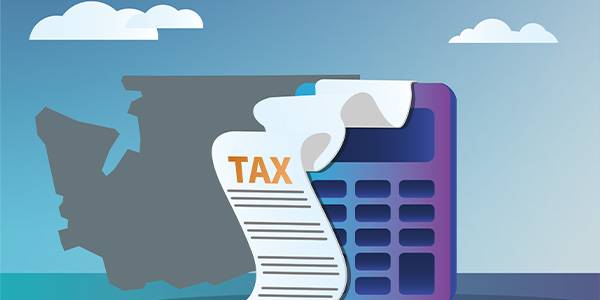Major Tax Changes Coming to Washington State
May 20, 2025
by Mike Nelson

Image source: iStock Wenjin Chen and Robin Olimb
Originally posted, 5/2/25. Updated 5/20/25: Governor Ferguson signed HB 2081 and SB 5814 into law on May 20, 2025.
On Sunday, April 27, the Washington State Legislature passed a nearly $78 billion budget on the last day of the 2025 legislative session. The legislation updated a substantial number of tax policies in order to finance spending in the state’s now adopted budget.
Engrossed Substitute House Bill 2081 (HB 2081) made noteworthy changes to the state’s business and occupation (B&O) taxes. Notably for the profession was a new tier and rate in the service industry. Service providers earning more than $5 million annual gross receipts will now pay a B&O rate of 2.1%. This is an increase for these companies from the rate of 1.75%, which previously had been levied on any company making more than $1 million in gross receipts.
Another part of this bill addresses some of the confusion of the Antio, LLC vs. Dept. of Revenue Washington Supreme Court (Antio)case from last year. During the entire legislative session, the WSCPA and other stakeholders had been seeking legislative clarity around the ambiguities that the existing statute left in light of the Antio case. For most of the session, DOR had countered that this was a long-standing statute that was not overly confusing. During the final weeks of the session, however, DOR provided language to the legislators that made several changes to this provision.
- The language used by the Supreme Court to define the investments in question, “investments that are incidental to the main purpose of the person’s business,” has been put into statute. This does clarify the previous ambiguity when the statute had simply said “investments.” However, DOR and the legislature provided no clarity around another question, the determination of “the main purpose of the person’s business.”
- The language provided by DOR puts into statute a simple 5% threshold for what incidental means. DOR had argued in court and maintained when questioned by the legislature that they have been administering a 5% safe harbor since the law was written in 2002. However, the DOR now states that a 5% safe harbor is too administratively burdensome and so requested, and the legislature adopted, a strict 5% limit.
- DOR provided language that exempted mutual funds and most nonprofits. The nonprofit exemption is a major win for the many nonprofits, foundations, private colleges, and others that had their endowment funds and other investments subjected to this tax in light of the Antio case. However, DOR has said that this new policy will take a year for them to administer, and so the effective date for these exemptions is January 1, 2026. The liability for nonprofits and all other entities subjected to this tax for the current year and past years remains in doubt.
- The WSCPA and other organizations also spoke with legislators and were able to have added to the proposal exemptions for retirement accounts and family investment vehicles.
While these changes are welcome when they become effective in January 2026, the legislation also directs DOR to establish and release rules and guidance to clarify this 23-year-old law. The remaining issues include nuances to the apportionment, whether the 5% safe harbor or threshold is annual or over a reporting period, and what it means to engage in business. The WSCPA Government Affairs team will continue to monitor and engage in the DOR rulemaking process around this issue, as well as during the next legislative session, when additional statutory clarity will be sought.
Another notable bill was Engrossed Substitute Senate Bill 5814 (SB 5814). This bill modifies what is subject to sales tax. At one point, the WSCPA team learned that a draft of the bill would have specifically added accounting and other professional services to be subject to sales tax. While we were pleased that this was removed in the introduced version of the bill, there is a modification to the exclusions of “digitally automated services” (DAS). The bill removes the exclusion for predominately human effort. This means that accounting services and other professional services no longer have an exclusion from sales tax under DAS. DAS is defined as “any service transferred electronically that uses one or more software applications.” The implication for the CPA profession is that any engagement with a client that uses an online portal will likely subject that engagement to sales tax. The legislature was unwilling to add this exemption back in and this goes into effect on October 1, 2025. The WSCPA and other professional services have asked Governor Ferguson to veto this section of the bill and allow for a thoughtful discussion and debate about this issue in a future legislative session.
A second part of 5814 that will also impact the profession is the addition of “live presentations” to the sales tax. This means all CPE and conferences will now be subject to sales tax. This provision was removed at one point from the bill, but without notice and past the amendment deadline, the legislature removed the committee amendment and voted out the previous version of the bill during a single day. We intend to seek an exemption for CPE and other license-required courses during the next legislative session, but like the DAS changes, this takes effect October 1. As currently interpreted, this provision could also impact other live presentations like some offerings of colleges and schools or other organizations in many different industries.
Both 2081 and 5814 were introduced on April 15 and passed in fewer than 10 days.
It is unfortunate that the legislature chose to pass quickly these bills with new policies that had not been vetted by the communities or public. We are continuing to work with our professional partners on solutions and to obtain clarity for these and other issues when the next legislative session begins in January 2026.

Mike Nelson is WSCPA Manager of Government Affairs. You can contact Mike via email.
LEARN MORE
- Free MEMBER EXCLUSIVE POP UP: Post-Legislative Session Update: Major Tax Changes in Washington State and National Issues WEBCAST – May 8, 2025
- Washington State Tax Conference – May 14, 2025
- The New Washington Sales Tax for Accounting Services WEBINAR – May 21, 2025
- WSCPA Membership Summit 2025 IN PERSON – June 12, 2025
